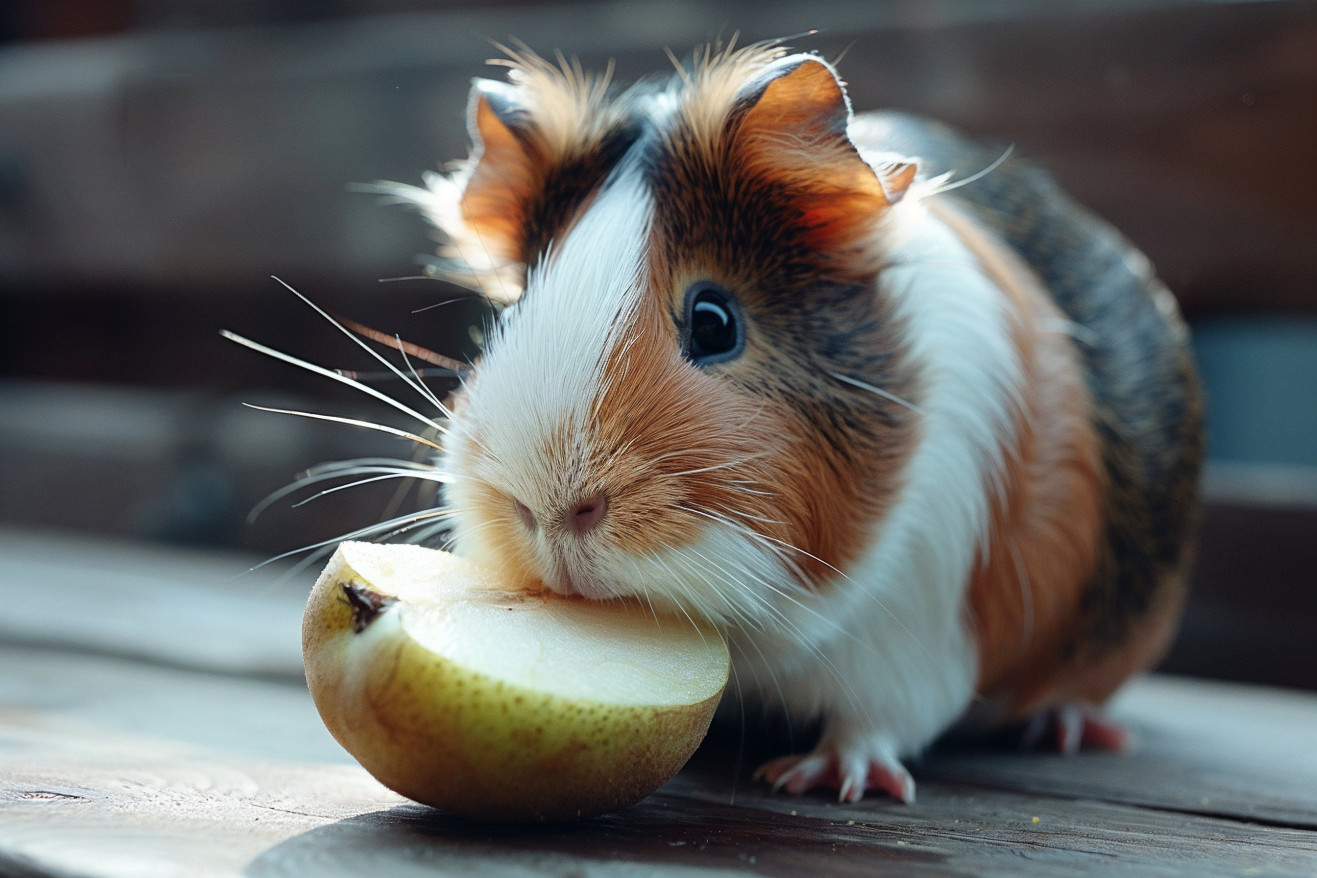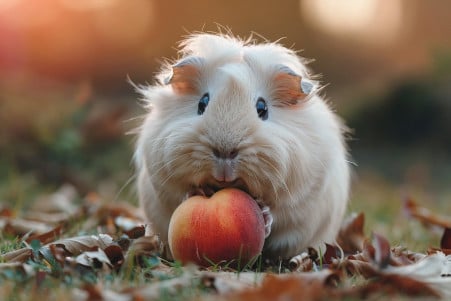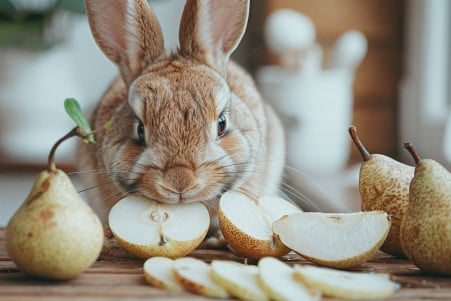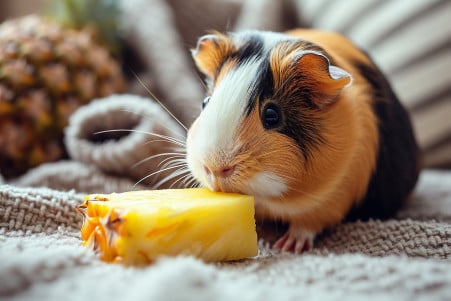Can Guinea Pigs Eat Pears? Nutritional Insights for Pet Owners
5 March 2024 • Updated 4 March 2024

When pears are in season, they can be plentiful, but can guinea pigs partake in this sweet fruit? The answer is yes, but guinea pigs can only eat pears in small amounts and as an occasional treat.
Although pears are high in sugar, they also contain the essential vitamin C that guinea pigs need. As a result, small pieces of pear can be given as a treat every once in a while, but it’s important to avoid feeding them too much because it can lead to digestive upset and an unbalanced diet.
This article will discuss the intersection of veterinary nutrition and pet care, focusing on the nutritional requirements of guinea pigs. It will also look at information from animal nutritionists and animal health professionals to explain the pros and cons of feeding pears to guinea pigs. By summarizing this information, this article will help pet owners better understand whether or not they should feed their guinea pigs fruit, including pears.
Can guinea pigs eat pears?
The Best Diet for Guinea Pigs Includes Pears
Guinea pigs love the sweet taste of pears, and this fruit is full of important nutrients that can help your pet. According to Healthline, a medium-sized pear has vitamins C (which guinea pigs can’t produce on their own) and K, potassium, and copper. Pears are also a good source of dietary fiber and antioxidants, including flavonoids and anthocyanins, that can help with your guinea pig’s well-being.
But the high sugar content in pears is something to be aware of. Medical News Today notes that a medium pear has about 17.2 grams of sugar, so it’s important to limit the amount you give your guinea pig to avoid the potential health problems that come with overconsumption. Too much sugar can lead to obesity and other health problems in guinea pigs.
To make sure your guinea pig gets the good stuff without the bad, you should slowly add pears to their diet. Nutritionists recommend giving your guinea pig pears once or twice a week, and when you do, make sure the portion is small—two or three small pieces is plenty.
This will help limit the amount of sugar your guinea pig consumes and reduce the risk of digestive issues while still allowing them to get the benefits of this fruit, including the important vitamin C that they need.
Vitamin C: An Important Nutrient for Your Guinea Pig’s Health
Like humans, guinea pigs can’t produce their own vitamin C and need to get it from their food to avoid scurvy, which can cause symptoms like weakness, skin issues, and joint pain.
Studies referenced by PubMed have shown that a lack of vitamin C can lead to other health problems, including delayed wound healing and a weakened immune system.
Veterinary professionals, including those who have written for Veterinary Partner, recommend giving adult guinea pigs 20–25 mg of vitamin C per day and increasing that to 30–40 mg during pregnancy. While pears can be a tasty way to meet these needs, it’s important to make sure that you’re getting vitamin C into your guinea pig through other foods to ensure a well-rounded diet.
By making sure that you’re also including vitamin C–rich foods like bell peppers, kale, and the occasional pear in your guinea pig’s diet, you can help make sure that you’re keeping your pet healthy while also avoiding too much sugar.
With a little bit of care in choosing from these different options, you can make sure that you’re providing your pet with a diet that’s both nutritious and enjoyable, which can help ensure that you both have a long, happy life together.
How to Balance Sugar in Guinea Pig Diets
In terms of sugar, pears are considered to be moderately high in sugar when compared to other fruits.
According to WebMD, a medium pear has about 17 grams of sugar, which is about the same amount of sugar found in bananas and watermelon.
This is in comparison to avocados and raspberries, which have much lower sugar content, at 1.33 and 5 grams of sugar, respectively.
Since guinea pigs can experience the same health issues as humans when they consume too much sugar, including obesity and diabetes, it’s important that guinea pig owners make sure that the amount of fruits like pears that they give their pets is limited.
While natural sugars in fruit are good for guinea pigs, according to Eat This, Not That, it’s important to make sure that they’re eating them in moderation.
One way to do this is to make sure that the pears are being given to guinea pigs in conjunction with other fruits that are lower in sugar, such as berries or melons.
By choosing fruits that have different nutritional values, guinea pig owners can make sure that their pets are getting the benefits of fruit without the negative effects.
In addition, by making sure that the fruit that they give their pets is high in fiber, guinea pig owners can make sure that their pets’ digestive health is supported, which is an important part of their diet.
Fiber: An Important Element of Guinea Pig Digestion
Fiber is a critical part of a guinea pig’s diet and digestive system. As outlined in the NCBI’s Nutrient Requirements of the Guinea Pig, guinea pigs have adapted to a diet that is high in fiber due to the vegetation they eat. This means that pears, with their fiber content, can be a helpful treat that aids in digestion and helps the body produce important fatty acids and vitamins.
Too little fiber in a guinea pig’s diet can lead to digestive problems, while too much can lead to digestive upset. The RSPCA notes that a balanced diet for guinea pigs should include a range of high-fiber foods, including hay, which is important for both digestive and dental health.
This means that pet owners should be sure to add high-fiber fruits like pears to their guinea pig’s diet in moderation. For example, giving a guinea pig a slice or two of pear every once in a while can help ensure they get the fiber they need while still eating their primary diet of hay and nutritionally complete pellets.
How to Feed Pears to Your Guinea Pig
When you first introduce pears to your guinea pig, make sure to give them a small piece to see how they react to it. The Humane Society recommends feeding pears to guinea pigs in moderation due to their sugar content.
To start, give your guinea pig a piece of pear that is no larger than a cubic inch, and no more than once or twice a week. This will help you avoid any digestive issues and prevent your guinea pig from taking in too much sugar.
It’s important to keep an eye on your guinea pig after you introduce pears into their diet. If you notice any changes in their behavior, eating habits, or stool, you should stop feeding them pears. According to The Spruce Pets, if you see any negative side effects, like diarrhea or a lack of energy, you should take pears out of their diet and contact your vet.
To ensure that your guinea pig is getting a well-rounded diet, make sure that you’re also feeding them high-fiber foods like hay, which should make up the bulk of their diet.
Leafy greens and vitamin C–fortified guinea pig pellets can be given in addition to the fruit, which will help ensure that your guinea pig is getting a well-rounded and nutritious diet.
Make sure to take out any uneaten food to keep it fresh and avoid spoilage. By following these tips, you can make sure that pears are a safe addition to your guinea pig’s diet, and help contribute to their overall well-being.
Final Thoughts on Adding Pears to Your Guinea Pig’s Diet
As we’ve discussed, pears can be a healthy and tasty snack for your guinea pig as long as they are given in moderation. They are a good source of important vitamins, especially vitamin C, and dietary fiber, which is important for a healthy digestive system. However, the sugar in pears means that you need to be careful about how much you give your pet to avoid the negative effects of too much sugar.
A healthy guinea pig diet will be well-rounded and include a mix of foods to make sure that all of their nutritional needs are being met, with pears making up just a small part of the overall diet. Pet parents should pay attention to their guinea pig’s reaction to pears and make changes to their diet as needed.
For personalized dietary recommendations, be sure to talk to a vet, who can help you come up with a diet plan that is tailored to your guinea pig’s specific needs.
And, as always, part of being a good pet parent is making sure that you are making the best choices for your pet’s diet. This will help ensure that you are contributing to their health and happiness, and that you are setting them up for a long and healthy life.


